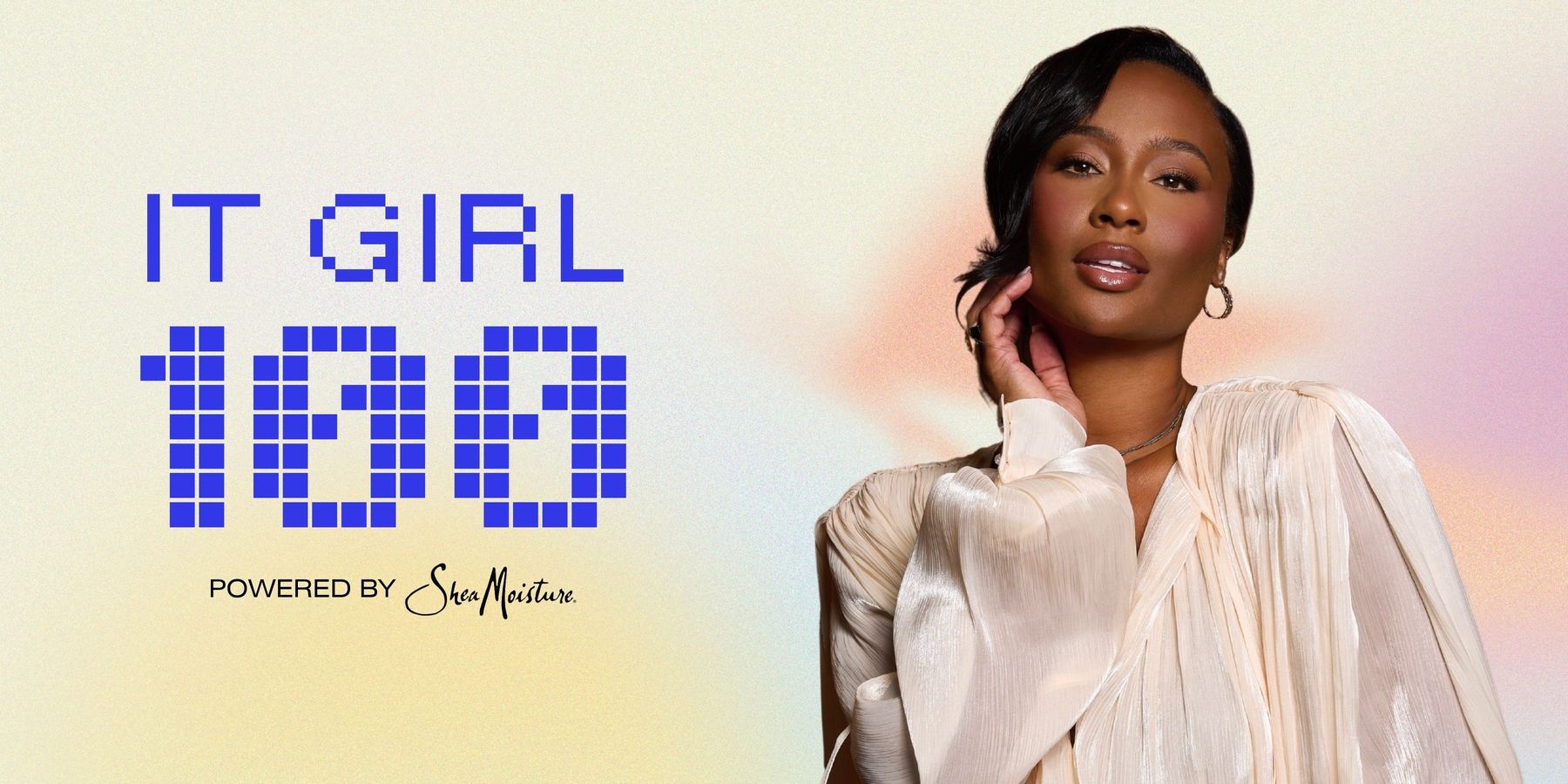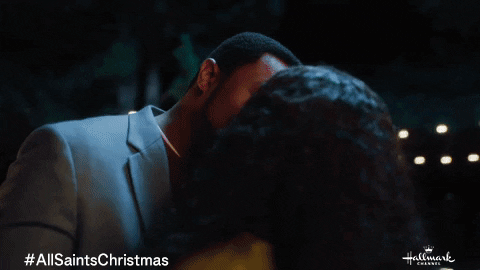
I grew up with examples of married couples all around me: my parents, grandparents, and the majority of my aunts and uncles on both sides of my family were together since I was born. As a 10-year-old child who was predisposed to seeing marriage as a normal part of life, I never considered the interworkings of how one comes to be married, but rather, I was conditioned to believe it was something that just kind of happened when you were a grown-up. Fast forward twenty years later and here I am a successful Black woman who has no husband.
While I don't personally feel like I'm missing out having never been married, I can say that it's caused me to do some serious soul-searching, and research, on why some women are choosing to delay the date, rather than save it.
Marriage Trends Among Black Women
For decades, scholars have studied the marriage gap in the United States. It's no secret that marriage rates in the Black community lag in comparison to those among other races. A study by R. Kelly Raley, Megan M. Sweeney, and Danielle Wondra compared the marriage patterns of Black, white, and Hispanic American women. They discovered that Black women married later in life than both age groups and were overall less likely to ever marry. Additionally, Black women's marriages tended to have higher rates of "marital instability." Finally, the study revealed that Black women had higher divorce rates than white women, at all stages of life and ages. And it seems that the more educated a Black woman is, the less her chances for finding a husband who shares her income or educational achievements are.
Additional sources agree that college-educated black women are less likely to marry than any other group. But all is not lost. It's not that Black women don't want to be married, but it seems that Black millennials, in particular, are redefining the ideals of marriage to fit their terms, opting for cohabitation relations or what is known as the beta marriage. Likewise, there may be another trend that offers a glimmer of hope for those still dreaming of wedded bliss. The most dramatic trends are that of interracial dating and marriages with Black women accounting for 12 percent of the US population, according to data from Pew Research Center.
Societal Pressures & Expectations Of Women’s Roles
 media.giphy.com
media.giphy.comConsidering the seriousness of such a commitment as marriage, it baffles me to understand the pressure that comes from people like our family and friends, as kind-hearted as they may be, to almost make you feel at fault for not making the trip down the aisle sooner.
I believe that never marrying or taking time to decide on a life-long partner is an admirable choice, but it seems that people would almost prefer you "try" even if it means you fail at marriage and having kids than to "not try" at all. I can't help but get the feeling that what people really want to say is, "It's all right to try and fail – but goddamnit, you'd better try."
If you grew up as I did, then you likely saw your parents married and grandparents married for the duration of their lives. Because children are a product of their environment, they often live what they learn. And the Disney fairy tales we grew up watching only reinforced the idea that it was our duty as little women to wait for Prince Charming to save us from an unenchanted life rather than to pursue one on our own.
Popular culture and classic films, such as Sleepless in Seattle would also have you believing that singlehood is the worst thing in the world and that your fate would end in one of two tragic ways: becoming an old maid or an increased chance of, get this, being killed by a terrorist. Luckily, for single women, that myth has been thoroughly debunked, but the inscription of the old maid remains forever sketched into our subconscious.
Career Vs. Relationship: You Be The Judge
There have been public discussions over the years that point to reasons for the "single, Black woman". In 2010, ABC hosted an all-star panel to figure out, "Why A Successful Black Woman Can't Find a Man". Some of the reasons included stereotypes, unfaithful partners, and availability of quality mates of the same race, to name a few. Unfortunately, for single sisters out there, the odds of finding a decent Black man are scarce, although not completely exhausted.
According to the U.S. Bureau of Justice Statistics (BJS) in 2018, Black males accounted for 34 percent of the total male prison population. But for women who are willing to look beyond the color lines, scholarly studies show promise for those who are open to exploring romantic relationships outside their race. When given the odds of finding a suitor that matches your educational, aspirational, and ethnic criteria, one could argue that a longer wait time is the only choice.
Finally, there are economic factors. I would be remiss not to include the fact that sistas are more financially independent than ever before. Although most research maintains that the pay gap is still dramatically lower for Black women than any other group, including Black men, that hasn't stopped us from starting new businesses and flourishing at a rate higher than any other demographic. Gone are the days of being dependent on a man for economic support. While women may not be actively rejecting the onset of a relationship, we are certainly selecting the procurement of the bag.
What Does It Mean To Be A Strong Black Woman?
Black girl magic is nothing new. We know that Black women helped build the foundation that this country stands on today and we continue to contribute to society through our leadership and business ventures. And while this is a good look for us, economically speaking, I'm curious as to what it implies for Black women personally.
For our mothers and their mothers, being a strong Black woman has meant we were caretakers. Not only to our children but also the children in the community and sometimes, other people's children for whom they were paid to care for to make a living.
 you is kind the help GIFGiphy
you is kind the help GIFGiphyWhen you recall the slave experience of Black women who were forced to perform wifely duties for men that weren't their husbands, the idea of marriage may be somewhat disenchanting. Having to cook and clean and launder their clothes for little to nothing in exchange, should it be a surprise that more women aren't jumping at the chance to (jump the broom) enter into a union that never really served them? Sadly, this experience isn't just limited to Black women. History documents decades of women being regarded as inferior to men and limited to subservient roles in relationships.
For single women today, being a "strong Black woman" often means having to step into the role that tradition has deemed as "masculine" or "dominant" to provide for her family if there isn't a male figure present. As single mothers, Black women take on the responsibilities of both mother and father, breadwinner, and primary guardian, for not only her children but also the aging family member, leaving little time for herself, let alone time to nurture a romantic relationship.
In this regard, I can't help but wonder if black women are choosing this option because they see it as their only choice. In the same breath, Black women may not necessarily be choosing their careers, entrepreneurship, or anything else... maybe, just maybe, they're finally choosing themselves.
Are you a member of our insiders squad? Join us in the xoTribe Members Community today!
Feature image by Shutterstock
- Successful Black Women Best Career Advice Ever - xoNecole ... ›
- Amanda Seales Black Women Self-Care Wellness - xoNecole ... ›
- 46% Of Women Say Career Is More Fulfilling Than Marriage ... ›
- Black Women Don't Get Married Myth - xoNecole: Women's Interest ... ›
- Raising the Race: Black Career Women Redefine Marriage ... ›
- The Economics of Marriage Often Don't Work for Black Women - The ... ›
- Why are so few Black women married in America? - Marketplace ›
- Career, Marriage, and Family Aspirations of Young Black College ... ›
- Marriage eludes high-achieving black women ›
Exclusive: Viral It Girl Kayla Nicole Is Reclaiming The Mic—And The Narrative
It’s nice to have a podcast when you’re constantly trending online. One week after setting timelines ablaze on Halloween, Kayla Nicole released an episode of her Dear Media pop culture podcast, The Pre-Game, where she took listeners behind the scenes of her viral costume.
The 34-year-old had been torn between dressing up as Beyoncé or Toni Braxton, she says in the episode. She couldn’t decide which version of Bey she’d be, though. Two days before the holiday, she locked in her choice, filming a short recreation of Braxton’s “He Wasn’t Man Enough for Me” music video that has since garnered nearly 6.5M views on TikTok.
Kayla Nicole says she wore a dress that was once worn by Braxton herself for the Halloween costume. “It’s not a secret Toni is more on the petite side. I’m obsessed with all 5’2” of her,” she tells xoNecole via email. “But I’m 5’10'' and not missing any meals, honey, so to my surprise, when I got the dress and it actually fit, I knew it was destiny.”
The episode was the perfect way for the multihyphenate to take control of her own narrative. By addressing the viral moment on her own platform, she was able to stir the conversation and keep the focus on her adoration for Braxton, an artist she says she grew up listening to and who still makes her most-played playlist every year. Elsewhere, she likely would’ve received questions about whether or not the costume was a subliminal aimed at her ex-boyfriend and his pop star fiancée. “I think that people will try to project their own narratives, right?” she said, hinting at this in the episode. “But, for me personally – I think it’s very important to say this in this moment – I’m not in the business of tearing other women down. I’m in the business of celebrating them.”
Kayla Nicole is among xoNecole’s It Girl 100 Class of 2025, powered by SheaMoisture, recognized in the Viral Voices category for her work in media and the trends she sets on our timelines, all while prioritizing her own mental and physical health. As she puts it: “Yes, I’m curating conversations on my podcast The Pre-Game, and cultivating community with my wellness brand Tribe Therepē.”
Despite being the frequent topic of conversation online, Kayla Nicole says she’s learning to take advantage of her growing social media platform without becoming consumed by it. “I refuse to let the internet consume me. It’s supposed to be a resource and tool for connection, so if it becomes anything beyond that I will log out,” she says.
On The Pre-Game, which launched earlier this year, she has positioned herself as listeners “homegirl.” “There’s definitely a delicate dance between being genuine and oversharing, and I’ve had to learn that the hard way. Now I share from a place of reflection, not reaction,” she says. “If it can help someone feel seen or less alone, I’ll talk about it within reason. But I’ve certainly learned to protect parts of my life that I cherish most. I share what serves connection but doesn’t cost me peace.
"I refuse to let the internet consume me. It’s supposed to be a resource and tool for connection, so if it becomes anything beyond that I will log out."

Credit: Malcolm Roberson
Throughout each episode, she sips a cocktail and addresses trending topics (even when they involve herself). It’s a platform the Pepperdine University alumnus has been preparing to have since she graduated with a degree in broadcast journalism, with a concentration in political science.
“I just knew I was going to end up on a local news network at the head anchor table, breaking high speed chases, and tossing it to the weather girl,” she says. Instead, she ended up working as an assistant at TMZ before covering sports as a freelance reporter. (She’s said she didn’t work for ESPN, despite previous reports saying otherwise.) The Pre-Game combines her love for pop culture and sports in a way that once felt inaccessible to her in traditional media.
She’s not just a podcaster, though. When she’s not behind the mic, taking acting classes or making her New York Fashion Week debut, Kayla Nicole is also busy elevating her wellness brand Tribe Therepē, where she shares her workouts and the workout equipment that helps her look chic while staying fit. She says the brand will add apparel to its line up in early 2026.
“Tribe Therepē has evolved into exactly what I have always envisioned. A community of women who care about being fit not just for the aesthetic, but for their mental and emotional well-being too. It’s grounded. It’s feminine. It’s strong,” she says. “And honestly, it's a reflection of where I am in my life right now. I feel so damn good - mentally, emotionally, and physically. And I am grateful to be in a space where I can pour that love and light back into the community that continues to pour into me.”
Tap into the full It Girl 100 Class of 2025 and meet all the women changing game this year and beyond. See the full list here.
Featured image by Malcolm Roberson
If there is one thing that I am going to do, it’s buy myself some scented soy candles. And, as I was looking at a display of them in a TJ Maxx store a couple of weekends ago, I found myself wondering just who decided which scents were considered to be “holiday” ones. The origin stories are actually pretty layered, so, for now, I’ll just share a few of ‘em.
I’m sure it’s pretty obvious that pine comes from the smell of fresh Christmas trees; however, scents like cloves, oranges, and cinnamon are attributed to two things: being natural ways to get well during the cold and flu season, and also being flavors that are used in many traditional holiday meals.
Meanwhile, frankincense and myrrh originate from the Middle East and Africa (you know, like the Bible does — some folks need to be reminded of that—eh hem — Trumpers) and ginger? It too helps with indigestion (which can definitely creep up at Thanksgiving and Christmas dinner tables); plus, it’s a key ingredient for ginger snaps and gingerbread houses. So, as you can see, holiday-themed scents have a rhyme and reason to them.
Tying this all in together — several years ago, I penned an article for the platform entitled, “Are You Ready To Have Some Very Merry ‘Christmas Sex’?” Well, in the spirit of revisiting some of that content, with a bit of a twist, I decided to broach some traditional holiday scents from the perspective of which ones will do your libido a ton of good from now through New Year’s Eve (check out “Make This Your Best NYE. For Sex. EVER.”).
Are you ready to check some of them out, so that, whether it’s via a candle, a diffuser, some essential oil, or some DIY body cream (check out “How To Incorporate All Five Senses To Have The Best Sex Ever”), you can bring some extra festive ambiance into your own boudoir? Excellent.
1. Vanilla
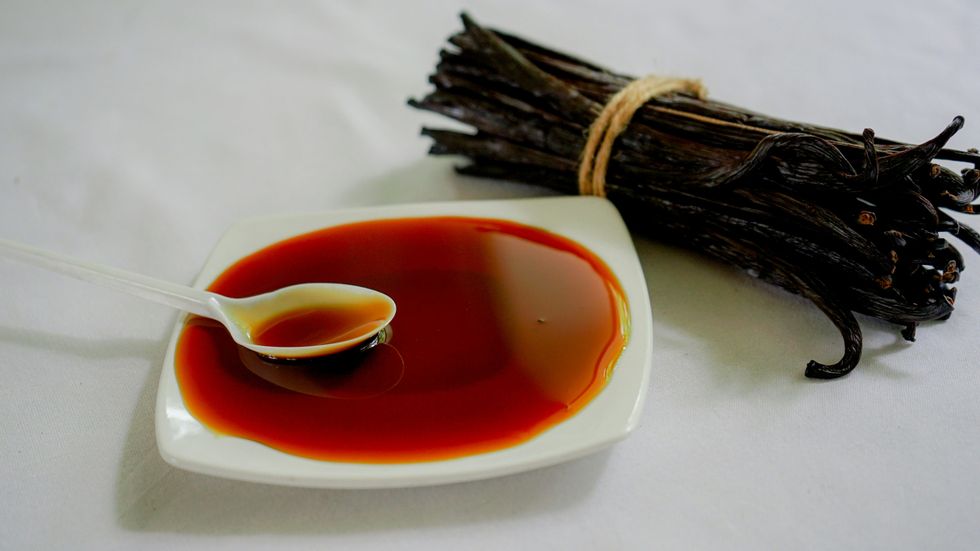
Unsplash
When it comes to holiday desserts, you’re going to be hard-pressed to find recipes that don’t include vanilla — and that alone explains why it is considered to be a traditional holiday scent. As far as your libido goes, vanilla is absolutely considered to be an aphrodisiac — partly because its sweet scent is considered to be very sensual. Some studies even reveal that vanillin (the active ingredient in vanilla) is able to increase sexual arousal and improve erectile dysfunction in men. So, if you adore the smell, here is more incentive to use it.
2. Frankincense
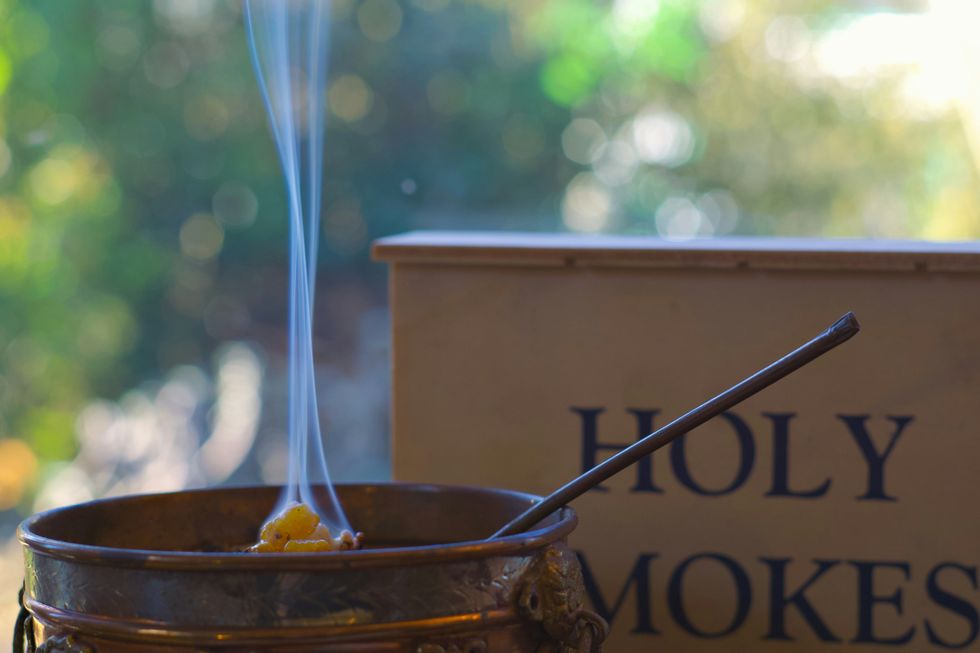
Unsplash
Although, typically, when people think about frankincense (and myrrh), it’s in the context of the gifts that the wise men brought Christ after he was born; it’s a part of the biblical Christmas story. However, frankincense goes much deeper than that. Sexually, since it has an earthy and spicy scent, some people like to use it to meditate (check out “What Exactly Is 'Orgasmic Meditation'?”). Also, since it has the ability to put you in a better mood, soothe and soften your skin and maintain your oral health — with the help of frankincense, every touch and kiss can be that much…sexier.
3. Cinnamon
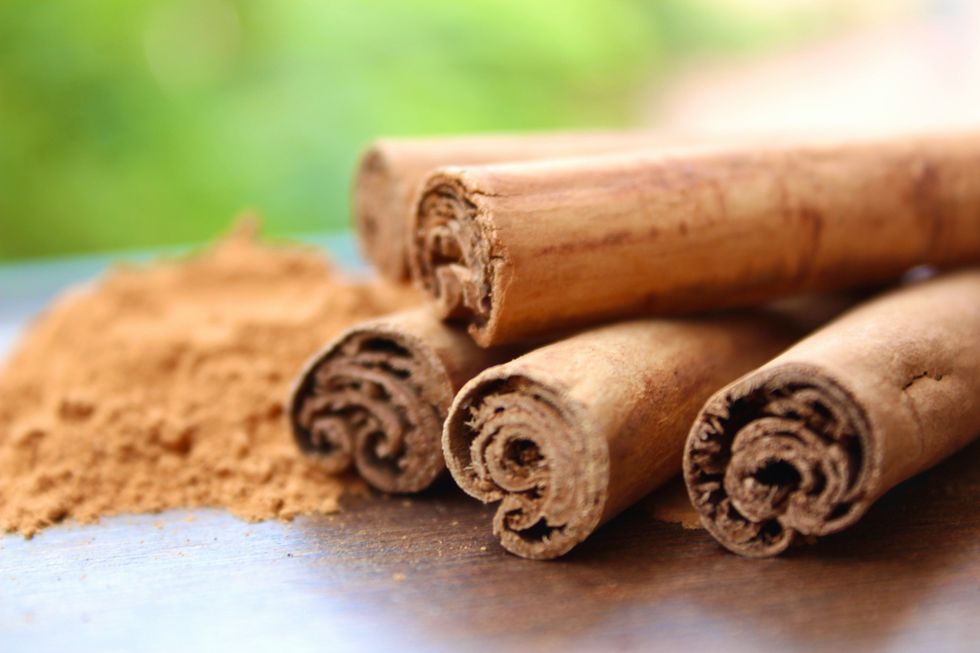
Unsplash
I already gave cinnamon a shout-out in the intro. Personally, I’ve been a fan of it, in the sex department, for a long time now (check out “12 ‘Sex Condiments’ That Can Make Coitus Even More...Delicious”). When it’s in oil form, it can be very sweet to the taste while sending a warm sensation throughout the body — which is why the giver and receiver of oral sex can benefit from its usage. Beyond that, cinnamon helps to increase blood flow to your genital region, elevate sexual desire and, some studies say that it can even help improve fertility. Beautiful.
4. Peppermint

Unsplash
If there’s a signature candy for the holiday season, it’s probably a candy cane — which automatically puts peppermint in the running for being an official holiday scent. Pretty much, in any form, it’s got your sex life’s back because it’s hailed as being a sexual stimulant; in part, because its smell is so invigorating. Plus, it helps to (eh hem) ease headaches, it gives you more energy and it can definitely help to freshen your breath. Also, that minty sensation? The same thing that I said about cinnamon can apply to peppermint too (if you catch my drift).
5. Ginger

Unsplash
Whether it’s in a meal or in your bedroom, ginger is going to produce results that are hella spicy. On the sex tip, science has praised ginger for being able to increase sexual arousal, improve blood circulation (which intensifies orgasms) and strengthen fertility for many years. Scent-wise, I find it to be one that both men and women enjoy because it is both woodsy and sweet. So, if you’ve got some massage oil in mind, adding some ginger is a way to please you both.
6. Pomegranate
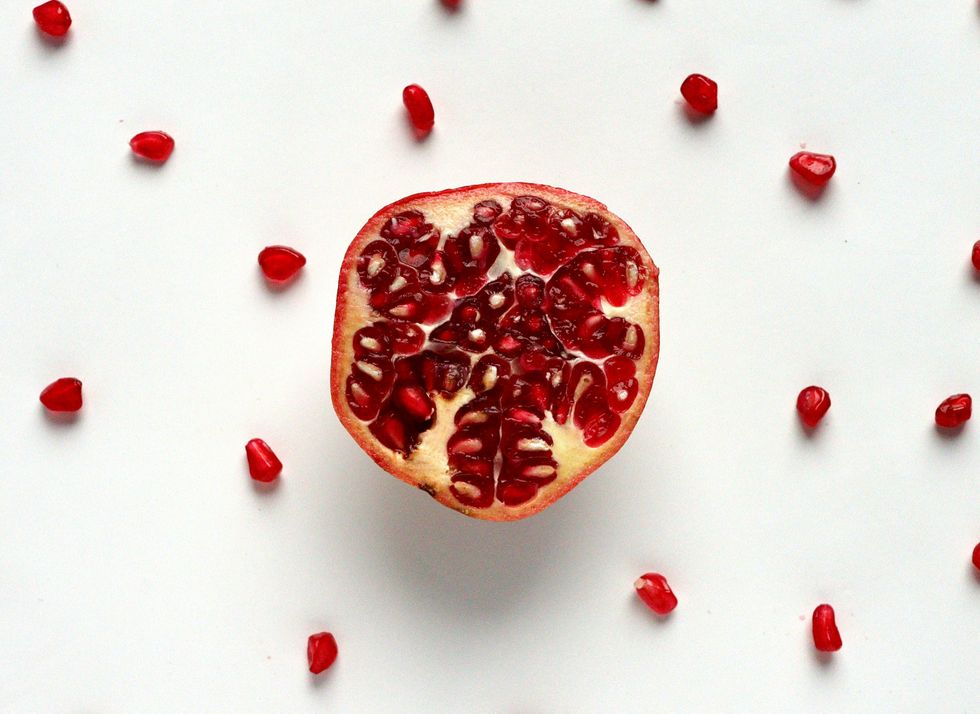
Unsplash
September through December is the time of year when pomegranates are considered to be in season. And, as someone who is a Rosh Hashanah observer, I have a personal adoration for them because I am aware of the various things that they symbolize in Hebrew culture including the fact that they are a fruit that represents love and fertility. So yeah, they would absolutely be an aphrodisiac — one that is perfect for this time of the year. While consuming it helps to boost testosterone levels in both men and women, the floral bittersweet smell that it produces can help to reduce stress while promoting relaxation (like most floral scents do) — and the more relaxed you are, the easier it is to climax.
7. Nutmeg
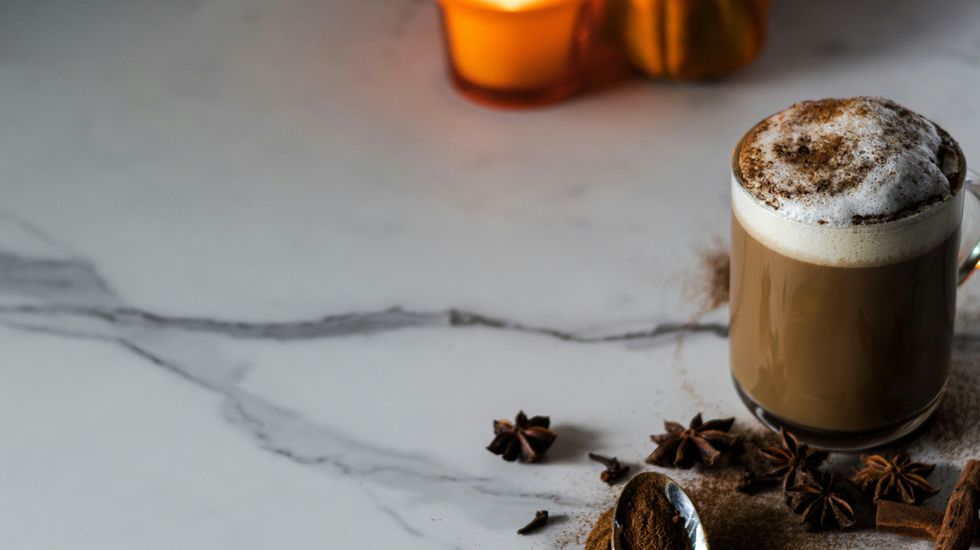
Unsplash
Another signature seasoning during the holiday season is nutmeg. It’s perfect in Thanksgiving sweet potato (or pumpkin) pie and Christmas morning French toast. And yes, it can also make your sex life better. If you consume it, it can intensify your libido and, overall, its warm-meets-spicy-meets-sweet smell is so inviting that it is considered to be a pretty seductive scent.
8. Cloves
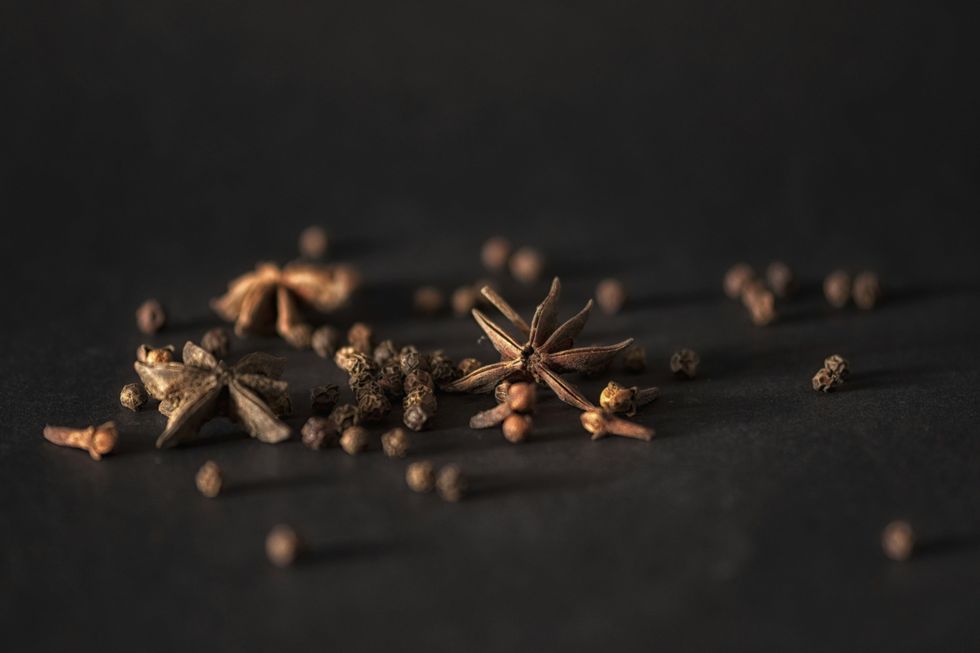
Unsplash
I ain’t got not one lie to tell you — if you’ve got a toothache, put some clove oil on that bad boy and send me a Christmas present for putting you on game. Aside from that, as I round all of this out, cloves are another holiday scent that can do wonders for your sex life. For men, it has the ability to significantly increase sexual arousal and improve stamina and endurance. For men and women alike, it also has a reputation for strengthening sexual desire. And for women solely? Well, if you want an all-natural way to increase natural lubrication down below — the scent and and feel (in DILUTED oil form) can make that happen. It can make the holidays especially special…if you know what I mean.
Ah yes — the atmosphere of the holidays and what it can do.
Take it all in! Scent ‘n whatever stimulating that comes with it! #wink
Let’s make things inbox official! Sign up for the xoNecole newsletter for love, wellness, career, and exclusive content delivered straight to your inbox.
Featured image by Giphy








